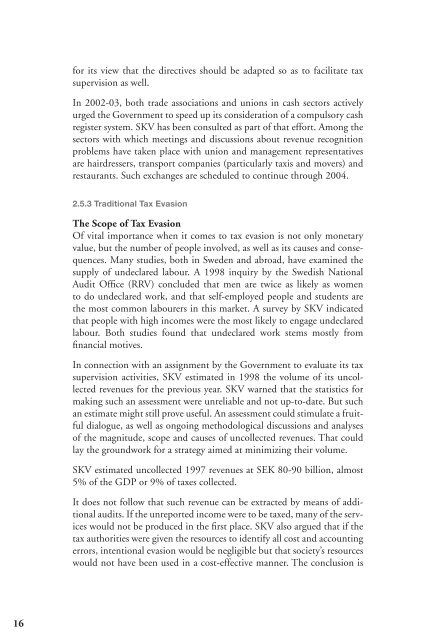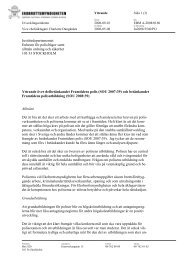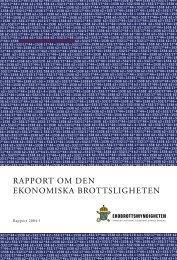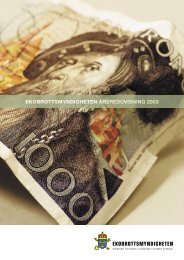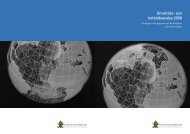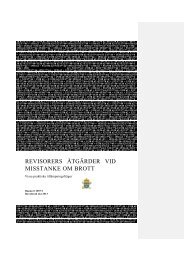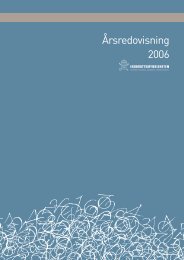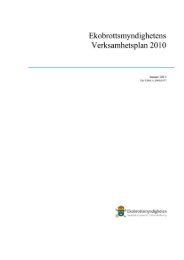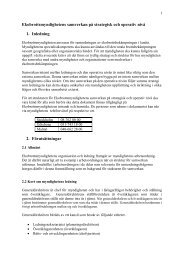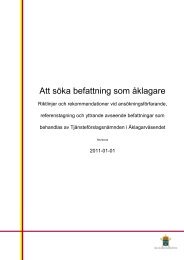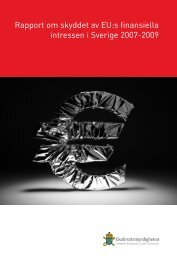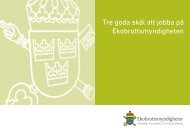Economic crime report 2004 - Ekobrottsmyndigheten
Economic crime report 2004 - Ekobrottsmyndigheten
Economic crime report 2004 - Ekobrottsmyndigheten
You also want an ePaper? Increase the reach of your titles
YUMPU automatically turns print PDFs into web optimized ePapers that Google loves.
for its view that the directives should be adapted so as to facilitate tax<br />
supervision as well.<br />
In 2002-03, both trade associations and unions in cash sectors actively<br />
urged the Government to speed up its consideration of a compulsory cash<br />
register system. SKV has been consulted as part of that effort. Among the<br />
sectors with which meetings and discussions about revenue recognition<br />
problems have taken place with union and management representatives<br />
are hairdressers, transport companies (particularly taxis and movers) and<br />
restaurants. Such exchanges are scheduled to continue through <strong>2004</strong>.<br />
2.5.3 Traditional Tax Evasion<br />
The Scope of Tax Evasion<br />
Of vital importance when it comes to tax evasion is not only monetary<br />
value, but the number of people involved, as well as its causes and consequences.<br />
Many studies, both in Sweden and abroad, have examined the<br />
supply of undeclared labour. A 1998 inquiry by the Swedish National<br />
Audit Office (RRV) concluded that men are twice as likely as women<br />
to do undeclared work, and that self-employed people and students are<br />
the most common labourers in this market. A survey by SKV indicated<br />
that people with high incomes were the most likely to engage undeclared<br />
labour. Both studies found that undeclared work stems mostly from<br />
financial motives.<br />
In connection with an assignment by the Government to evaluate its tax<br />
supervision activities, SKV estimated in 1998 the volume of its uncollected<br />
revenues for the previous year. SKV warned that the statistics for<br />
making such an assessment were unreliable and not up-to-date. But such<br />
an estimate might still prove useful. An assessment could stimulate a fruitful<br />
dialogue, as well as ongoing methodological discussions and analyses<br />
of the magnitude, scope and causes of uncollected revenues. That could<br />
lay the groundwork for a strategy aimed at minimizing their volume.<br />
SKV estimated uncollected 1997 revenues at SEK 80-90 billion, almost<br />
5% of the GDP or 9% of taxes collected.<br />
It does not follow that such revenue can be extracted by means of additional<br />
audits. If the un<strong>report</strong>ed income were to be taxed, many of the services<br />
would not be produced in the first place. SKV also argued that if the<br />
tax authorities were given the resources to identify all cost and accounting<br />
errors, intentional evasion would be negligible but that society’s resources<br />
would not have been used in a cost-effective manner. The conclusion is<br />
16


